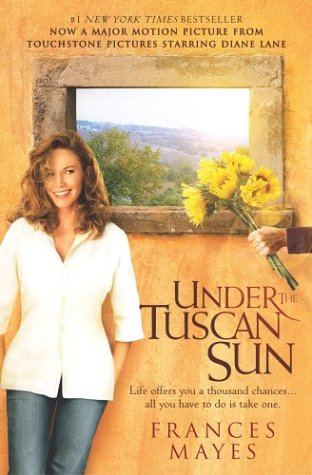Reviewed by gmcgregor on
First things first: the movie (which I've never seen) is apparently not a strict adaptation of the book. While in both cases Frances' divorce from an apparently very wealthy man (she mentions it only vaguely in the book) is what enables her to purchase the home, the movie apparently gives her a hot new Italian man to mend her broken heart. In reality/the book, she is already happily remarried by the time she decides to start looking for a summer home in Italy. Let me stress that again: they have the means to start searching for a summer home in ITALY. If rich white people doing home renovation, eating food, and contemplating their navels is not your deal, this book will not be for you. I've seen rather a lot of negative reviews focused on the premise that the book is not like the movie and/or annoyed that it's about nothing more than wealthy people doing construction and eating.
There are reasons I found the book to be a mixed bag (hence the very middle of the road rating), but they don't have anything to do with either the lack of romance or the privilege. Well, sort of the latter, I guess, because my biggest beef with the book is that there isn't really any conflict. Story structure has remained remarkably consistent over recorded history, which means there are clearly elements that are naturally appealing to people when they're taking in a tale. One of the fundamental pieces of a story is conflict: we want to see our protagonists struggle with obstacles. Frances...doesn't, really. She obliquely mentions that things are expensive, but there's never any indication she has to scrimp or save or go without in order to afford them. She and her husband do a lot of DIY to fix the place up, but the impression is that they enjoy doing it, and don't need to do it for money's sake. It all just seems to roll along...they find the house, they buy it, they do gradual repairs, they start spending a lot of time there, they make new friends, and they're happy. Which must be lovely to experience, but pretty boring to read about.
What saves it from being a total snooze is the writing. Mayes is a poet, and it shows. It's beautifully written, and the way she writes lets you see with your mind's eye the lawn at Bramasole with the bright yellow table she had painted, loaded with fresh and simple but delicious food, looking out on the olive trees and flowers and rolling hills. There's an enjoyable element of wish fulfillment fantasy...very very few people will ever get to live the kind of dreamy life she shows us (I have no doubt there were and are less wonderful elements behind the scenes, but she doesn't go into them), so it gives us a window into what seems like an incredible experience. But I had trouble focusing on it because I was honestly mostly bored after about the first 100 pages or so.
Reading updates
- Started reading
- 12 July, 2016: Finished reading
- 12 July, 2016: Reviewed
